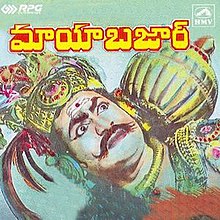
Mayabazar is a 1957 Indian epic Hindu mythological film directed by K. V. Reddy. It was produced by Nagi Reddi and Chakrapani under their banner, Vijaya Productions. The film was shot simultaneously in Telugu and Tamil, with a few differences in the cast. The story is an adaptation of the folk tale Sasirekha Parinayam, which is based on the characters of the epic Mahabharata. It revolves around the roles of Krishna and Ghatotkacha, as they try to reunite Arjuna's son Abhimanyu with his love, Balarama's daughter (Savitri). The Telugu version features Gummadi, Mukkamala, Ramana Reddy, and Relangi in supporting roles, with D. Balasubramaniam, R. Balasubramaniam, V. M. Ezhumalai, and K. A. Thangavelu playing those parts in the Tamil version.

Missamma is a 1955 Indian Telugu-language romantic comedy film directed by L. V. Prasad. It was produced by Nagi Reddi and Chakrapani on Vijaya Productions banner. The film stars N. T. Rama Rao, Savitri, Akkineni Nageswara Rao and Jamuna. The script was adapted by Chakrapani from Rabindranath Maitra's Bengali play Manmoyee Girls School. It revolves around two unemployed people — M. T. Rao and Mary — who pose as a married couple to obtain employment in a high school founded by Gopalam, a zamindar. As Rao and Mary fall in love, Gopalam's nephew A. K. Raju learns that Mary is Gopalam's missing elder daughter Mahalakshmi; she is unaware of her true identity.

Kadiri Venkata Reddy was an Indian film director, screenwriter, and producer who primarily worked in Telugu cinema. He is considered as one of the greatest directors in the history of Telugu cinema. He directed 14 feature films and won three National Film Awards and a Filmfare Award South.

Lava Kusa is a 1963 Indian Hindu mythological film directed by C. S. Rao and his father C. Pullayya. The film was scripted by Sadasivabrahmam, Samudrala Sr. along with C. S. Rao and C. Pullayya. The film was produced by Sankara Reddy under Lalita Sivajyothi Films. Lava Kusa is the first full-length colour film of Telugu cinema.
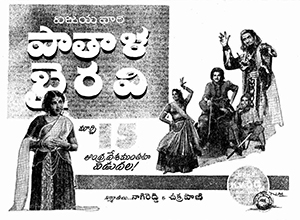
Pathala Bhairavi is a 1951 Indian fantasy film directed by K. V. Reddy who co-wrote the film with Pingali and Kamalakara Kameswara Rao. Shot simultaneously in Telugu and Tamil languages, the film was produced by Nagi Reddi and Chakrapani under the banner Vijaya Productions. It stars N. T. Rama Rao, S. V. Ranga Rao and K. Malathi. The film focuses on a gardener's son who has to amass wealth equal to that of the king of Ujjain to marry his daughter and a sorcerer who has to sacrifice an intelligent and brave young man to Goddess Pathala Bhairavi to gain access to a statuette which can grant any wish.
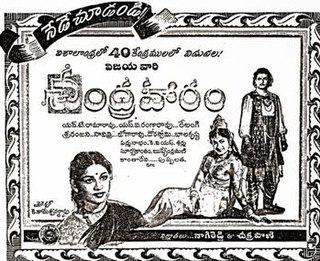
Chandraharam is a 1954 Telugu-Tamil bilingual swashbuckler film directed by Kamalakara Kameswara Rao in his debut. It was produced by Nagi Reddy-Chakrapani under the Vijaya Productions banner. It stars N. T. Rama Rao, Savitri and Sriranjani Jr., with music composed by Ghantasala. The film was not commercially successful.
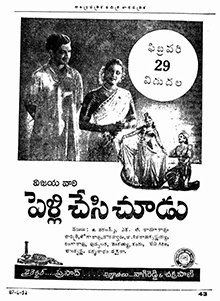
Pelli Chesi Choodu is a 1952 Indian satirical comedy film directed by L. V. Prasad and produced by Nagi Reddi and Chakrapani under their company Vijaya Productions. The film was made simultaneously in Telugu and Tamil, the latter titled Kalyanam Panni Paar. It stars N. T. Rama Rao, G. Varalakshmi, Yandamuri Joga Rao and Savitri. S. V. Ranga Rao, Sivarama Krishnayya, Doraswamy, and Suryakantham play supporting roles in the Telugu version while C. V. V. Panthulu replaced Krishnayya in Tamil.

Appu Chesi Pappu Koodu is a 1959 Indian Telugu-language comedy drama film directed by L. V. Prasad. The film was produced by Nagi Reddi and Chakrapani of Vijaya Productions; the latter co-wrote its script with Prasad and Vempati Sadasivabrahmam. It is the Telugu version of Prasad's Tamil film Kadan Vaangi Kalyaanam (1958). Starring N. T. Rama Rao and Savitri, Appu Chesi Pappu Koodu features Jaggayya, C. S. R. Anjaneyulu, S. V. Ranga Rao, and Jamuna in supporting roles. The conflict between two older men with different mindsets—Ramadasu and Mukundarao —is the film's centrepiece.

Rechukka is a 1955 Indian Telugu-language swashbuckler film directed by P. Pullaiah. The film stars N. T. Rama Rao and Anjali Devi, with music composed by Aswatthama. The story was inspired by The Prince Who Was a Thief (1951), starring Tony Curtis.
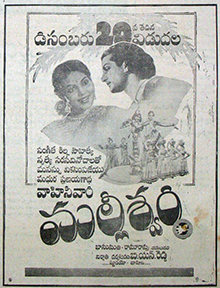
Malliswari is a 1951 Indian Telugu-language historical romance film produced and directed by B. N. Reddy under his banner Vauhini Studios. P. Bhanumathi and N. T. Rama Rao star as a couple – Nagaraju and Malliswari – who are separated by Malliswari's greedy mother. Malliswari is sent to the king's palace according to the custom of "Rani Vasam", a tradition during the Vijayanagara Empire wherein young women were fetched to the palace with an offering of gold and jewellery to their parents. The rest of the film focuses on the consequences faced by Nagaraju when he, against all rules, surreptitiously enters the palace to meet Malliswari.

Pellinaati Pramanalu is a 1958 Indian Telugu-language comedy drama film, produced and directed by K. V. Reddy. It stars Akkineni Nageswara Rao and Jamuna, with music composed by Ghantasala. The film was simultaneously made in Tamil as Vaazhkai Oppandham with a slightly different cast that released the following year.
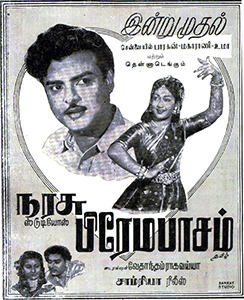
Prema Pasam is a 1956 Indian Tamil-language film, produced by V. L. Narasu and directed by Vedantam Raghavayya. It is a remake of the Hindi film Kismet (1943). The film stars Gemini Ganesan and Savitri, with music composed by S. Rajeswara Rao. It was simultaneously shot in Telugu as Bhale Ramudu (1956).
Gali Penchala Narasimha Rao (1903–1964), also known as Gali Penchalayya, was an Indian film music composer. He was a representative of the first generation of music directors in Indian cinema. He debuted with the Telugu version of Seetha Kalyanam in 1934. Sri Krishna Leelalu (1935) was another musical hit of his. His music has contributed to the success of Balaraju (1948). The songs Cheliya Kanarava by Ghantasala and Evarine Nenevarine by S. Varalakshmi were the melodies which attracted many those days.

Adutha Veettu Penn is a 1960 Indian Tamil-language romantic comedy film directed by Vedantam Raghavayya and written by Thanjai N. Ramaiah Dass. The film stars Anjali Devi, T. R. Ramachandran and K. A. Thangavelu. It is a remake of the Bengali film Pasher Bari (1952), itself based on the namesake short story by Arun Chowdhury. In Adutha Veettu Penn, a simple man wants to impress a woman he loves by singing, but since he cannot, his friend, a singer, sings in secret while the simple man merely lip syncs, and wins the woman's love. The film was released on 11 February 1960, and became a success.
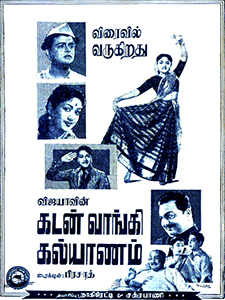
Kadan Vaangi Kalyaanam is a 1958 Indian Tamil-language satirical comedy film directed by L. V. Prasad. The film stars R. Ganesh, Savithri and Jamuna. It was simultaneously shot in Telugu as Appu Chesi Pappu Koodu, which was released the following year.

Missamma is the soundtrack of the 1955 Indian Telugu-language film of the same name directed by L. V. Prasad. Composed by S. Rajeswara Rao, the soundtrack contains 11 songs with lyrics by Pingali. The film was written by Chakrapani, who co-produced it with B. Nagi Reddi for Vijaya Productions. N. T. Rama Rao and Savitri played the lead roles the Telugu version, with Akkineni Nageswara Rao, Jamuna, S. V. Ranga Rao, Rushyendramani, Relangi and Ramana Reddy in supporting roles.

Guna Sundari or Gunasundari is a 1955 Indian Tamil-language film starring Gemini Ganesan and Savitri. The film was remake of the 1949 Telugu film Gunasundari Katha. It was not successful at the box office.

Missiamma is a 1955 Indian Tamil-language romantic comedy film directed by L. V. Prasad. Produced by B. Nagi Reddy and Aluri Chakrapani's Vijaya Vauhini Studios, the script was adapted by Chakrapani from the Bengali novel Manmoyee Girls School by Rabindranath Maitra. Missiamma also focused on social issues such as unemployment, corruption, and freedom of worship. Missiamma tells the story of two unemployed people of different religions and mentalities: Balu and Mary. They pose as a married couple to obtain jobs in a high school founded by Gopal, the zamindar of Aandipettai. As Balu and Mary fall in love, Gopal's nephew Raju learns that Mary is Gopal's missing elder daughter Mahalakshmi; she is unaware of her true identity.
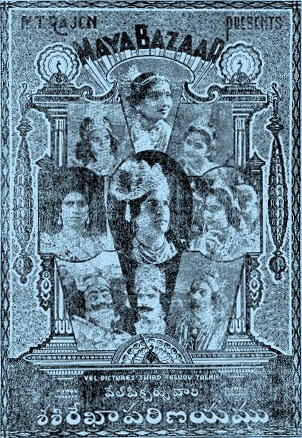
Mayabazar is a 1936 Indian Telugu-language fantasy film directed by P. V. Das and produced by Vel Pictures. The film stars Yadavalli Nageswara Rao, S. P. Lakshmana Swamy, Rami Reddy, and Santhakumari. Music was composed by Galipenchala Narasimha Rao.

Vaazhkai Oppandham is a 1959 Indian Tamil-language comedy drama film, produced and directed by K. V. Reddy. It stars Akkineni Nageswara Rao and Jamuna, with music composed by Ghantasala. The film was simultaneously made in Telugu as Pellinaati Pramanalu (1958) with a slightly different cast, but was released on 4 September 1959.
